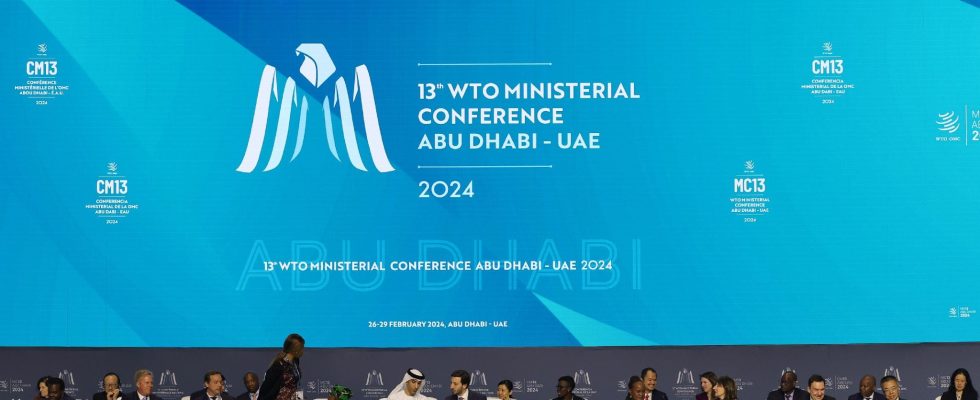In just one year, the World Trade Organization will celebrate its thirtieth anniversary. Thirty years old, the age of all possibilities. And yet, the Geneva institution has all the makings of a very old lady. Paralyzed, inaudible in the concert of nations.
The 13th WTO ministerial conference which is being held until Thursday in Abu Dhabi – the first since 2022 – will expose the gaping flaws that undermine the international organization. “Multilateralism is under attack from all sides. And it’s not just about the WTO,” declared emphatically its director general, the Nigerian Ngozi Okonjo-Iweala, at the opening of the high mass, calling on the international community to greater cooperation. A vain appeal. Against a backdrop of rattling boots and growing geopolitical tensions, outright attacks on free trade and Sino-American strategic war, the WTO is in a state of clinical death.
In fact, of the three major issues which will occupy the debates this week, only one has a slight chance of reaching an agreement, that of illegal fishing where new rules could be adopted. The other subjects on the table are explosive. The first: agriculture. A club of 19 countries, very large exporters of agricultural products and which brings together a good part of South America, Canada, Australia and even Indonesia, is campaigning for a drastic reduction – we are talking about half! – public support for farmers by 2034. A roadmap that the European Union, in the midst of an agricultural crisis, categorically refuses. Second subject of division: the implementation of customs duties on online exchanges. Since 1998, trade ministers within the WTO have always agreed on a moratorium on the implementation of customs taxes. Except that this moratorium expires at the end of this month and South Africa, India, Pakistan and even Indonesia are now defending the establishment of such rights.
Serious grooming would be necessary
Born on the rubble of the GATT in 1995, the WTO has aged badly. By the admission of one of its former directors, the Frenchman Pascal Lamy, it needs serious cleaning up. But who will still defend this institution whose record is very meager? It has proven incapable of dealing with the issue of undue state aid, these disguised subsidies which have allowed Chinese groups to grow very quickly and attack foreign markets with a lot of money in their pockets. It then got stuck in ludicrous calculation methods to prove the existence of dumping practices. As a result, the European photovoltaic industry was crushed by the massive arrival of Chinese solar panels sold almost at a loss. Finally, the WTO has never found a way to sanction violations of property rights, one of the main grievances of the United States against China.
Worse, today she is like a headless puppet. Since the start of the Trump years, the United States has blocked the appointment of new members to the appeals body, a sort of court of last resort in the event of a conflict between two countries. “The keystone of the WTO has not worked for years,” underlines Sébastien Jean, professor of economics at the CNAM.
In reality, the era of major trade agreements bringing together dozens of countries in the West, Africa or Asia seems well and truly over. From now on, the great powers prefer bilateral treaties, often regional, strictly regulating trade. In this respect, China is a model. In recent years, Beijing has signed free trade agreements covering almost 40% of its exports. With ASEAN countries in particular, customs tariffs on Chinese products have almost disappeared, going from 12.8% to 0.6% in just four years… As if an archipelago of the world was slowly taking shape before our eyes.
.
